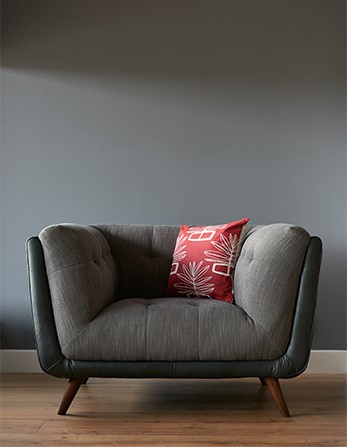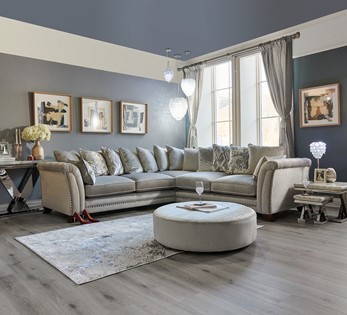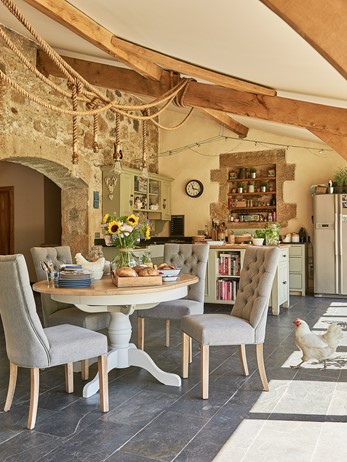Become Part Of The Family
Stay updated on new offers, the latest arrivals, and get inspiration for your home.

Sofas, by nature of their design, come in all manner of shapes and sizes. They might have tall arms, wide seats, chaise lounge elements or other unique features – all of which make measuring a sofa a little tougher than just whipping out a measuring tape.
From both a practical and emotional perspective, your sofa is a big part of your home. Even smaller sofas or those designed to be tucked into corners will still usually be the largest piece in your room.
Fortunately, with the help of our sofa expert Malcolm Walker, we’ve put together this complete guide to sofa measurements to help you make an informed choice.
Sofas are measured using width, depth and height. Each refers to a specific part of the sofa:
Width (W): The measurement from corner to corner at the longest straight line of the sofa.
Depth (D): The distance from the front of the cushion to the back of the sofa.
Height (H): The ‘tall’ element of the sofa – from the feet to the highest point at the back.
Height (H) and Depth (D) of a sofa.
Width (W) of a sofa.
All sofas use these measurements, but some types of sofas are more complex, so they require a little more measuring finesse:
Corner and modular sofas will be split into different ‘parts’, providing a width, depth and height for each.
Curved sofas are a little more complex, as they have a larger footprint than their depth measurement might suggest. This is because depth and width should be measured from the points where they are greatest. Height measurements, which are key to determining access to your home, fortunately, remain the same as for other sofa types.
To actually measure a sofa yourself, we’d advise using a tape measure, as the flexibility will help you work with the odd angles and shapes that can crop up.
Measure width arm-to-arm: Some guides demonstrate mattress width using the bottom of the sofa, but we’d advise measuring arm-to-arm in most cases. The only time you wouldn’t do this is if another element, such as the feet, extended wider than the arms.
Measure height correctly: Use the highest point of the back as your height measurement. Some sofa types have curved or arched backs, so finding the apex and using that as your measure is especially important.
Make a separate measurement for legs: If a sofa has removable legs, it’s worth taking a separate measurement outside of the total height to assess whether removing them will help with access to your home.
Measure diagonal depth: Diagonal depth is often missed but is crucial for determining access to your home. To find this measurement, you’ll need to take a straight diagonal measure at the end of the sofa, from the top back frame to the front bottom.

Learning how to measure a sofa is all well and good when you have one in your home. What about for a new sofa that is a different size? How should you measure for a new sofa and make an informed decision? Here are the most important steps.
Now you know how to measure a sofa and what a manufacturer’s stated measurements translate to, you can begin to work out if a sofa will fit in your home. Measure your doorway for height and width before making a decision.
The doorway’s width must be greater than the sofa’s height and diagonal depth, with some room for movement on each side.
If you have a narrow entryway, such as in a porch or hall, you’ll also need the depth of the space to compare against the sofa’s diagonal depth.
If the doorway isn’t suitable, a large window or another access point may work instead – but you’ll have to measure each of them before making a purchase decision.
Measure access points inside your home too. If your living room is through a few different doors, measure the doorways and any obstructions you can’t remove from the room, like radiators and other built-in objects.
If the sofa will be situated upstairs, the staircase must be wider than the height of the sofa. Account for any handrails or obstructions.
Don’t ever buy a sofa which is too big after doing these measurements under the assumption that ‘it will just have to fit.’ Instead, consider modular sofas, which can be delivered in parts, or sofas which come partially disassembled.

Sofas are usually the largest piece of furniture in a room, which can impact the overall perception of size and space. Choosing a too-large sofa might seem like a good idea until it’s suddenly dominating the room and making everything else feel cluttered. We’d advise doing the following:
Take the measurements of the sofa you want to buy, then lay out a footprint in newspapers, masking tape or other materials. This will give you a good idea of how large the sofa is and how it will impact the room.
Consider accessories – if you’re buying a footstool or armchair to go with your sofa, make sure you include measurements for them too.
Corner sofas, despite the name, don’t always need to be in the corner. A larger room might ‘swallow’ a sofa placed in a corner - whereas you could instead place it more centrally and use the corner angle to direct attention towards your TV or another focal point.
Whilst we know all of this pre-measuring may seem tedious, it’s important to make the right choice when you’re committing to a new sofa. You need the sofa and accessories to be able to fit into your home, both in terms of practical access and how well the sofa’s size fits your room.
Whatever size of sofa you need, you’ll find it here at Sterling Home. We’ve got great options, including low-back sofas, which are easier to fit through doorways and high-back options that suit larger rooms with tall ceilings.

Buying guides
Buying a sofa for your home isn’t like buying other things. A sofa is the cornerstone of your living space, around which you and your family will gather to relax. With such an important role in your life, your sofa-buying experience should be one of excitement.

Inspire me
When it comes to understated interiors, the Scandinavians do it best. Clean simple lines, a palette of cool and soft, pared-back colours, natural materials, and contemporary shapes and designs sit comfortably in modern living spaces.

Inspire me
Our Luxe look lets you aspire to luxury and style without the high ceilings and chandeliers.

Inspire me
Comfort is the name of the game with the Country interior design look. It’s all about the cosy, laid-back feel, with authentic and natural materials and textured linens.
Stay updated on new offers, the latest arrivals, and get inspiration for your home.

